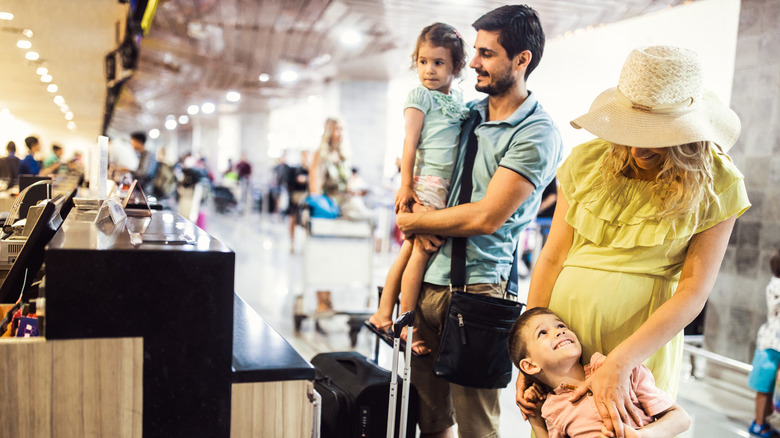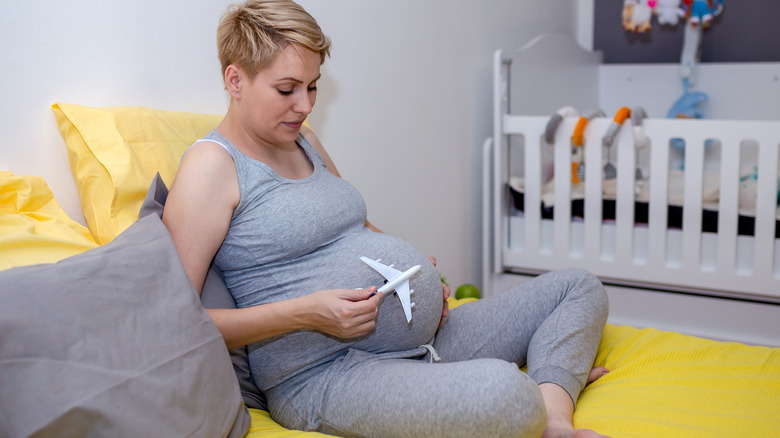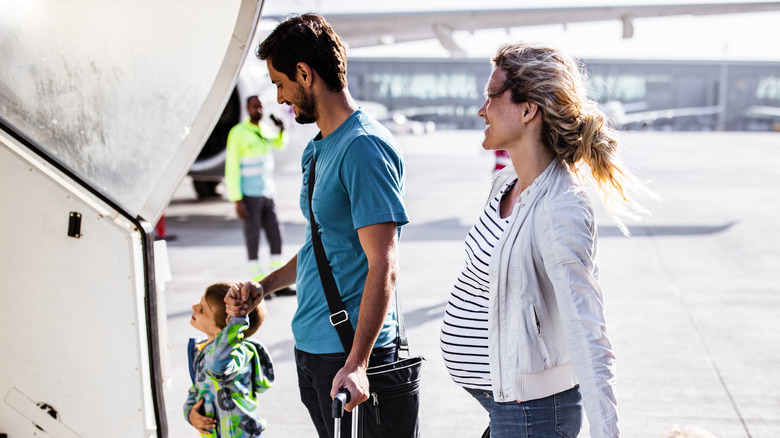Can You Fly While Pregnant? Here's What You Should Know
First of all, congratulations! We all understand how much you want to take care of the little bundle of joy you're carrying. While you're not barred from air travel until near your delivery date, you should expect some changes to your experience, especially if it's your first pregnancy. Of course, every pregnancy is different and you might find minimal changes to your air travel experience, but in general, flying while pregnant will give you a fresh set of eyes and a new appreciation of things.
You'll especially think about and prepare for your health and safety as well as that of your baby during the flight. You might also be thinking about your comfort while inside the plane, learn about your airline's policy on flying while pregnant, and many other things besides. So, whether it's for work, a babymoon, a visit to family or friends, or another reason, here are the things you should know about flying while pregnant.
Your airline's policies
Before booking your ticket, find out your airline's pregnant passenger policy. You can look at their website or reach out to them for confirmation or any other questions you might have. In general, you can fly up through the 36th week of pregnancy for domestic flights, though some airlines will require a medical certificate. On international flights, however, most airlines will only allow you to fly through the 32nd week of pregnancy or through the 28th week if you're carrying multiples. Note, however, that airline policies can change anytime, so always call them before reserving your flight.
In addition, remember that no matter how far along you are in your pregnancy, you should always consult your doctor and get their go signal. And, it never hurts to bring along a medical certificate in case a gate agent or other airline staff inquire about your pregnancy. "As with many things related to air travel, it's better to be safe than sorry," Dr. Nithya Gopal, director of OB-GYN services at Viva Eve in New York City, told The Points Guy. "It's definitely worth it, and sometimes necessary, to have medical documentation from your provider's office." The medical certificate should state how many weeks pregnant you are, whether you have a single or multiple fetuses, your estimated delivery date, any complications, and especially that you are fit to travel. And, it should be written on an official clinic or hospital letterhead and signed by your healthcare provider.
Other reasons you might be blocked from flying
In addition to the restrictions airlines have in place, other factors might also prevent you from flying. These include pre-existing medical conditions or a high-risk pregnancy, mandatory vaccines for travel, and outbreaks of diseases in your destination. If you have anemia, high blood pressure, gestational diabetes, and other conditions, you should talk to your doctor to discuss your travel plans, as these might cause a complication during your flight.
But, even if you're not high risk or have any of these conditions, it's still a good idea to consult your doctor about your trip. "There are a number of potential risks that go along with flying during pregnancy and those risks can change from week to week and month to month, so it's important to have that honest conversation with your doctor," Dr. Nithya Gopal told The Points Guy.
You should also avoid destinations where Zika or other illnesses that can harm you and your baby are spreading. According to the Centers for Disease Control and Prevention (CDC), Zika can cause microcephaly, a serious birth defect that results in a smaller-than-expected brain and incomplete brain development. It is mostly spread through mosquito bites and found mainly in Southeast Asia, the Pacific Islands, Africa, and elsewhere. Unfortunately, there is no vaccine or medicine for Zika, per the CDC. And, speaking of vaccines, always consult your doctor as getting live vaccines isn't recommended.
The best time to fly
Flying while pregnant is generally safe. During the first trimester, as your body adjusts to the baby in your womb, you might experience typical pregnancy symptoms such as nausea, vomiting, cravings, and so on. The trio of morning sickness, general discomfort, and fatigue you might be feeling will be major deterrents to traveling anywhere, especially by air. Talk to your doctor to discuss medication you can take to alleviate your symptoms during the flight.
On the other hand, the third trimester means you're nearing your term, and most healthcare providers do not advise domestic flights beyond your 36th week of pregnancy and after 28 to 35 weeks for international flights. In fact, your doctor might recommend you to stay at home or within 300 miles so you can easily receive medical assistance in the event of false or preterm labor, and any other problems.
Meanwhile, the second trimester — or 14 to 28 weeks — of pregnancy is the ideal time to travel, according to the American College of Obstetricians and Gynecologists (ACOG). Morning sickness and the other symptoms of pregnancy will most likely be gone during this time and you're not as heavy with child as you will be after 28 weeks or in your third trimester, nearing your due date. In the second trimester, you will have regained your stamina, can move about easily, and have the lowest risk of complications, so it's the perfect time to fly.
How flying affects you and your baby
When you fly, you'll have to deal with low humidity, cabin pressure changes, and other conditions inside the plane. The ACOG says you'll experience an increase in heart rate and blood pressure, but your body will adjust to these. And, it won't cause issues with your baby too, per the CDC.
On a long flight, you might be worried about your legs swelling or developing deep vein thrombosis (DVT), where a blood clot forms in veins. The ACOG notes that pregnant people are at a higher risk of developing DVT and recommends walking at regular intervals; wearing compression socks and loose clothing; and drinking plenty of water.
As for radiation concerns, the CDC says airport security machines emit low radiation levels, which it says aren't enough to harm your baby. You can always opt for a pat-down screening instead. You'll need over 1 (mSV) exposure to cosmic radiation throughout the 40 weeks of your pregnancy to be alarmed. The ACOG clarifies that your radiation exposure on the longest intercontinental flights will only amount to less than 15% of this limit. In other words, your baby will be exposed to minimal radiation when you fly; it's nothing to worry about, especially if you only fly occasionally. Talk to your doctor if you're a frequent flyer.
Comfort and safety precautions to take when flying pregnant
When you're pregnant, you'll want to wear comfortable slip-on shoes, and as mentioned, do some walking up and down the aisle frequently. In addition to your travel essentials, pack some snacks to nibble on when you're feeling peckish, and bring your own pillow to make your sitting position comfortable.
A travel kit consisting of necessary and recommended items for pregnant travelers will also be helpful. These include prescription medicines, first-aid items, sanitation supplies, and important travel-related documents. These documents should include your medical certificate as well as your prenatal records and healthcare provider contact details, especially if you're near term. Consider getting travel insurance as well, and find out where the nearest hospital or medical facility is in your destination, just in case. You should also consider joining the Smart Traveler Enrollment Program (STEP) to receive safety updates about your destination and be able to log your travel with the nearest U.S. Embassy or Consulate so it's easy for them and your loved ones to contact you in case of an emergency.
Above all these, nothing beats talking to your doctor about your travel plans. They can advise you on your planned itinerary and activities; vaccines and medicines; and other relevant information and recommendations. Schedule your appointment at least one month before your flight to have ample time to prepare.





